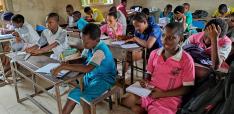Why a Narrative of the #PandemicOfTheUnvaccinated Risks Prolonging the Pandemic

Should unvaccinated people be held solely responsible for the sudden rise in COVID-19 cases in Europe?
Last week, Europe had the dubious distinction of having recorded 64 percent of all COVID-19 cases and also 57 percent of deaths from the disease worldwide. In different parts of the continent, we are seeing incidence numbers reaching record highs, and still soaring. It is, perhaps, no coincidence that European countries—especially German-speaking countries—with higher levels of vaccine hesitancy are seeing the greatest surges. The occurrence of the two phenomena together—low vaccination rates and high infection/death rates—has led the great and the good in Europe to come down hard on the unvaccinated. #PandemicOfTheUnvaccinated is trending on Twitter. Just a few days ago, Austria announced a lockdown specifically for the unvaccinated; although the measure had to be quickly replaced with a generalised lockdown of 20 days beginning on 22 November, the government announced that from 13 December, the lockdown would only apply to the unvaccinated. Other countries, such as Germany and Italy, are also cracking down on the anti-vaxxers.
We can understand where the desire to “punish” the unvaccinated comes from. We are all disappointed that incidence rates look much worse today than they did at this time last year. Policy-makers, having made foolhardy and premature promises of “no more lockdowns”, now fear that they will lose face if they have to re-impose restrictions. It is much easier for most people to have a group—in this case, the unvaccinated—to blame. And, perhaps, the inconvenience and shame of such targeted lockdowns may well persuade a few of the unvaccinated to finally go and subject themselves to a little pinprick. But overall, this trend is misguided and unwise.
Virologists and epidemiologists have warned fairly consistently that vaccines are only one important part of a multi-pronged solution. There are enough cases of “breakthrough infection” amongst the double-vaccinated—sometimes with extreme symptoms, long COVID, and worse. A drive that involves restrictions only for the unvaccinated—and a return-to-normal for all others—falsely suggests that the vaccine is a silver bullet. A recent review of the literature highlights that there is no evidence that mandatory vaccination would increase vaccine uptake, while some studies suggest that “green pass” certifications might actually reduce precautionary behaviours such as social distancing and handwashing. There is a good chance that without accompanying measures of masking up, maintaining physical distance, reducing unnecessary contact, and contact tracing, vaccines on their own will fail to curb the spread of the disease, as we are already seeing in Belgium and France, where strict measures were indeed in place that allowed access to cafés and restaurants only on proof of vaccination. This will wrongly lead vaccine sceptics to assume that vaccines do not work, and increase vaccine hesitancy, similar to the tirades we saw against lockdowns, when the real problem lay in premature or ill-planned opening up. A downward spiral will be more likely.
The causes for exponential growth in cases are several, including the more contagious Delta variant. Schools are undoubtedly hotbeds for the virus. Even if COVID-19 itself seems non-threatening to children, still too little is known about this novel virus: Who knows what the effects of such rampant exposure to the virus will be for these children in the long term? Besides, even if they are asymptomatic, they carry and spread the virus. And in many countries and within local jurisdictions, masks, tests, and quarantine regulations in schools are lax (or absent) with major loopholes. For example, when one child may be asked to quarantine due to a case in their class, the other children in the same family are allowed to go to childcare and schools as indeed are their parents to work. Far better support systems have to be in place to allow flexibilities of home office, especially in “non-essential” sectors, and tighter definitions of what constitutes “essential services”. Rigorous border controls will be needed, with the health emergency at hand trumping the normal (and admirable) free movement of people that the EU facilitates. Digitalisation holds a key to this, not only for children’s education but also for making the most of home office conditions. And above all, an empathy for each other’s problems.
This brings us to a bigger issue about pandemic narratives. Despite rhetorical claims by political leaders that we are all in the same boat, this pandemic has been both divided and divisive. The lack of vaccine access in poor countries, often due to the sins of omission and commission of the rich, is one example. Another example comes from countries within Western Europe, in some of which we saw an “othering” of the elderly and the vulnerable; such polarising narratives went hand-in-hand with delayed and lower-stringency policy measures to curtail the spread of COVID-19. So even while the “weaker” members of society were told to “cocoon” or “shelter”, the healthy and the young/middle-aged went about their lives with scarce disruption to their own indulgences and with little inclination to restrain their own activities to help the “others”.
The targeted vilification of the unvaccinated, in addition to getting the anti-vaxxers to dig their heels in rather than persuading them to get vaccinated, will deepen another nasty fault-line in our societies. Whereas what is desperately needed is for all of us to work together, to protect each other, and thereby, ourselves.
To be clear: both authors are vaccinated. The minute we were allowed access, we queued up to get our jabs in our respective countries. We cannot wait to get “boosted”. We have little sympathy for anyone who chooses to jeopardise the lives of others, and anti-vaxxers are undoubtedly a part of this group. But a narrative that lays the blame solely on the anti-vaxxers, complemented by corona restrictions that target solely this group, will be deeply counterproductive and will risk prolonging the pandemic.
Amrita Narlikar is President of the German Institute for Global and Area Studies (GIGA), Honorary Fellow of Darwin College at the University of Cambridge, and non-resident Senior Fellow at the Observer Research Foundation.
Cecilia Sottilotta is Assistant Professor of International Relations and Global Politics at the American University of Rome and Visiting Professor at the EU International Relations and Diplomacy Studies Department of the College of Europe (Bruges).
This piece first appeared on the ORF's website and was reposted with permission.


